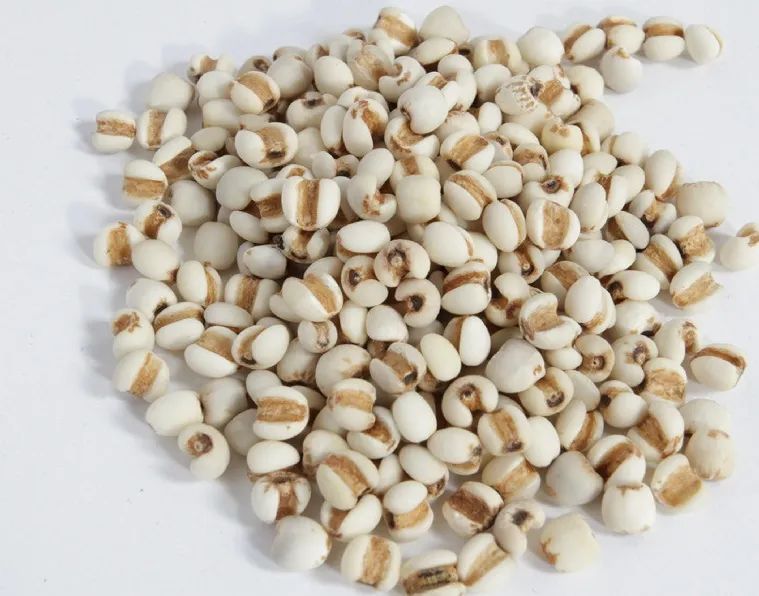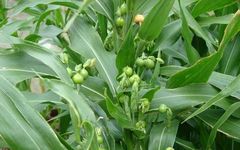Properties and Channels Sweet, bland, and cool. It enters the Spleen, Stomach, and Lung channels. Functions and Indications Promotes diuresis and drains dampness, strengthens the Spleen and stops diarrhea, alleviates bi syndrome, expels pus, and detoxifies and disperses masses. It is used for edema, beriberi, difficulty in urination, Spleen deficiency diarrhea, damp bi syndrome with contraction, lung abscess, intestinal abscess, warts, and cancerous tumors. For symptoms of damp-heat accumulation, it can be used with Hua Shi (Talc) and Tong Cao (Rice Paper Plant); for damp-warm pathogenic factors in the Qi level, especially with predominant dampness, it can be combined with Xing Ren (Apricot Kernel), Cao Ren (Cardamom), Zhu Ye (Bamboo Leaf), and Mu Tong (Akebia). This herb also has the function of strengthening the Spleen, used to treat Spleen deficiency edema and beriberi swelling and pain, often combined with Fu Ling (Poria), Bai Zhu (White Atractylodes), Mu Guo (Papaya), and Wu Zhu Yu (Evodia). For diarrhea and leukorrhea due to Spleen deficiency with dampness, it can be combined with Bai Zhu and Fu Ling. For bi pain and contraction caused by damp stagnation in the skin and muscles, it is often used with Gui Zhi (Cinnamon Twig) and Cang Zhu (Atractylodes). For lung abscess with chest pain and purulent sputum, it can be combined with Xian Lu Gen (Fresh Reed Root), Dong Gua Zi (Winter Melon Seed), Tao Ren (Peach Kernel), and Yu Xing Cao (Houttuynia). For intestinal abscess, it can be used with Bai Jiang Cao (Patrinia) and Fu Zi (Aconite). Yao Yi Gen (Job’s Tears Root) has similar functions to Yao Yi Ren (Job’s Tears Seed), clearing heat, promoting diuresis, and having an anthelmintic effect, which can treat abdominal pain due to parasitic accumulation.
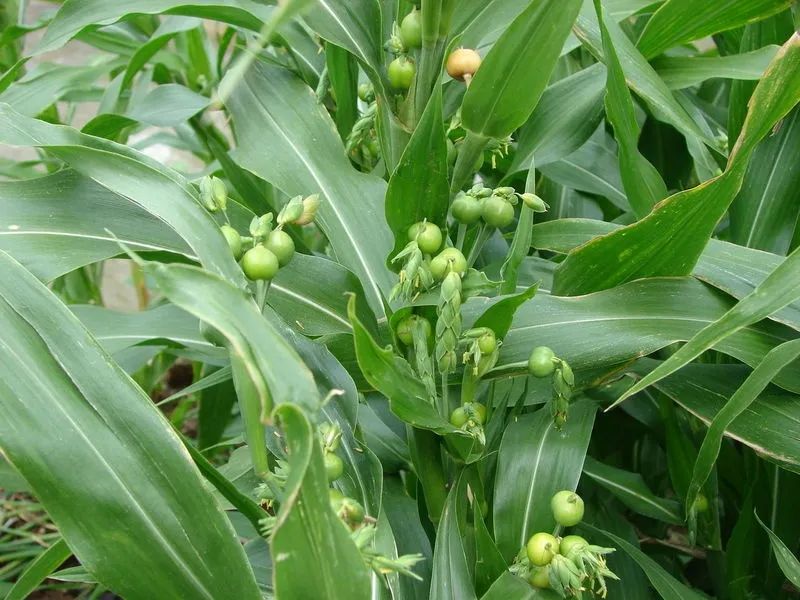
Dosage and Administration Oral: Decoction, 9-30 grams; or as a powder. Precautions Caution in cases of Spleen deficiency with constipation and in pregnant women. Source This herb is the dried mature seed of the plant Coix lacryma-jobi L.var.ma-yuen (Roman.) Stapf, belonging to the Gramineae family. It is harvested in autumn when the fruit matures, dried, and the seeds are separated from the husk, then dried again to remove the outer shell, brown seed coat, and impurities, collecting the seeds. It commonly grows near houses, in wastelands, by rivers, streams, or in damp valleys. It is widely distributed across most regions of the country, mostly cultivated. Characteristics The seeds are broad oval or long oval-shaped, 4-8 mm long and 3-6 mm wide. The surface is milky white and smooth, occasionally with remnants of the brown seed coat; one end is blunt and rounded, while the other end is wider and slightly concave, with a light brown dot-like hilum; the back is rounded and convex, and the belly has a wide and deep longitudinal groove. The texture is solid, with a white powdery cross-section. It has a slight aroma and a mildly sweet taste.
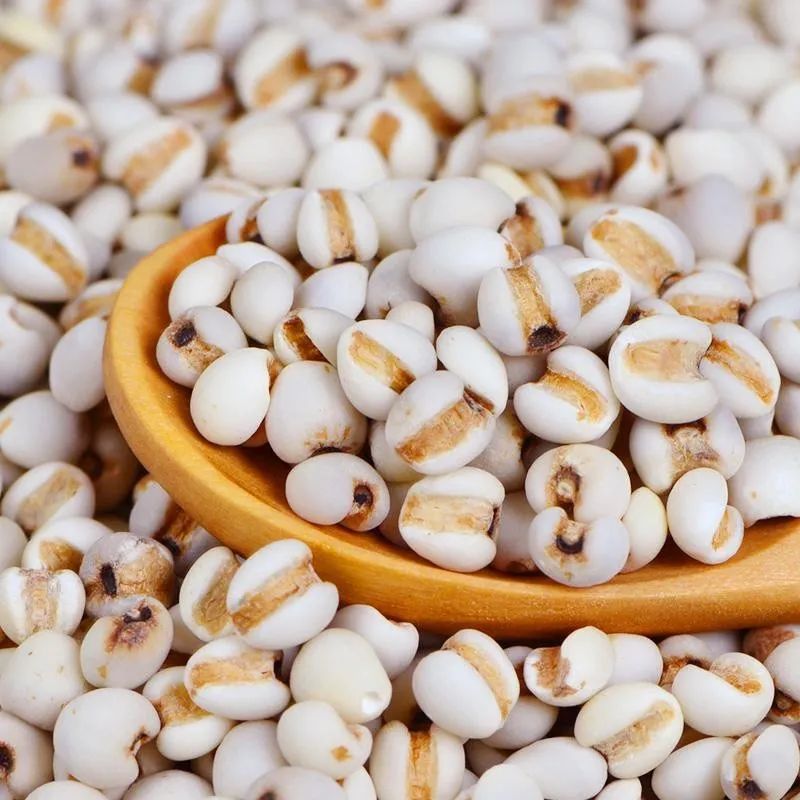
Preparation Stir-fried Job’s Tears Seed: Clean the selected Job’s Tears Seed and stir-fry in a pan over low heat until slightly yellow, then remove and cool. Alternatively, it can be stir-fried with bran (100 jin of Job’s Tears Seed with 10 jin of bran). Formulas ① For patients with full-body pain, fever, and severe symptoms in the afternoon, known as wind-damp, this condition is caused by sweating in the wind or prolonged exposure to cold: Ma Huang (Ephedra) 15 grams (soaked in decoction), Gan Cao (Licorice) 30 grams (roasted), Yao Yi Ren 15 grams, Xing Ren 10 pieces (peeled and roasted). Grind into a powder, take 15 grams each time, with 1.5 cups of water, boil down to 1 cup, strain and take warm, with slight sweating to avoid wind. (From “Jin Gui Yao Lue” Ma Huang Xing Ren Yao Yi Gan Cao Decoction) ② For wind-damp bi syndrome, limb weakness, and soreness in the waist and spine: Yao Yi Ren 500 grams, Zhen Sang Ji Sheng (Mulberry Mistletoe), Dang Gui (Angelica), Chuan Xiu Duan (Chinese Teasel), and Cang Shui (rice wash) each 200 grams. Divide into 16 doses, decoct in water. (From “Guang Ji Fang”) ③ For chronic wind-damp bi syndrome, tonifying Qi, promoting digestion, reducing edema, and eliminating evil Qi in the chest, treating muscle and tendon contraction: Grind Yao Yi Ren into powder, cook with glutinous rice to make porridge, and eat daily. (From “Gang Mu” Yao Yi Ren Porridge)
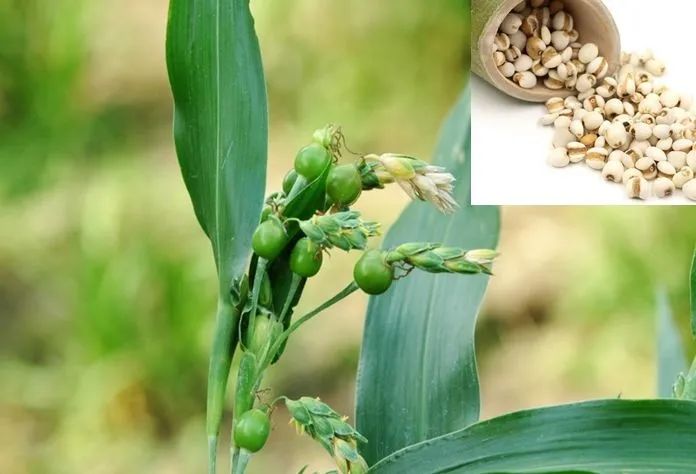
④ To eliminate wind-damp, strengthen muscles and bones, and tonify the Spleen and Stomach: Yao Yi Ren powder, brew with glutinous rice wine, or brew in a bag and drink. (From “Gang Mu” Yao Yi Ren Wine) ⑤ For edema and shortness of breath: Yu Li Ren 60 grams. Grind, filter with water, and cook with Yao Yi Ren rice, eat twice daily. (From “Du Xing Fang”) ⑥ For lung atrophy with purulent blood: Yao Yi Ren 300 grams. Crush, use 3 liters of water, decoct to 1 liter, add a little wine and take. (From “Mei Shi Ji Yan Fang”) ⑦ For lung abscess with cough and blood in sputum: boil Yao Yi Ren in strong bitter wine until concentrated, take warm. If there is blood in the lungs, it should be expelled. (From “Fan Wang Fang”) ⑧ For lung abscess with hemoptysis: Yao Yi Ren 300 grams. Mash, use 2 large cups of water, add a little wine, divide into two doses. (From “Ji Sheng Fang”) ⑨ For intestinal abscess, with a hard abdomen, pressing it feels swollen, no accumulation in the abdomen, no fever, pulse rapid, indicating pus in the intestines: Yao Yi Ren 100 grams, Fu Zi 6 grams, Bai Jiang Cao 5 grams. Grind these three ingredients into powder, take a spoonful with 2 liters of water, decoct until reduced by half, take at once, urination should follow. (From “Jin Gui Yao Lue” Yao Yi Fu Zi Bai Jiang Powder)
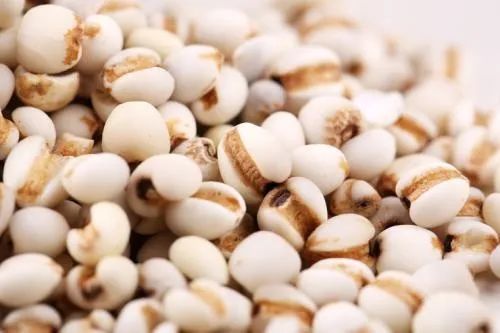
⑩ For intestinal abscess: Yao Yi Ren 1 liter, Mu Dan Pi (Peony Root), Tao Ren each 200 grams, Gua Ban Ren 1 liter. Combine these four ingredients, use 6 liters of water, boil down to 2 liters, divide into two doses. (From “Qian Jin Fang”) ⑾ For diabetes with excessive thirst: Yao Yi Ren cooked in porridge, and drink the porridge. (From “Gang Mu”) ⑿ For sand and stone heat dysuria, with unbearable pain: Yu Shu (all parts can be used), decoct in hot water, drink hot in summer, cold in winter, to promote urination. (From “Yang Shi Experience Fang”)
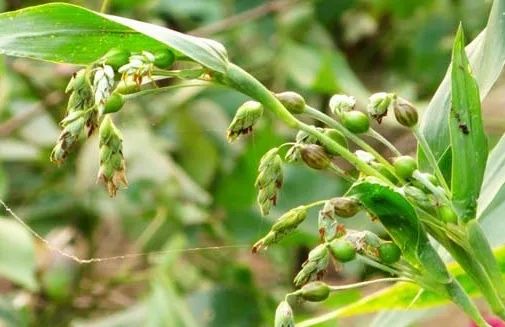
Literature Excerpts 1. “Ben Cao Bei Yao” Sweet and bland. Slightly cold and belongs to the Earth, a Yangming (Stomach) herb. Sweet benefits the Stomach, Earth overcomes Water. Bland drains dampness. Diuresis benefits Earth, thus strengthens the Spleen. Treats edema, damp bi syndrome, beriberi, diarrhea, and heat dysuria. Benefits Earth to generate Metal, thus tonifies the Lung and clears heat (white enters the Lung, slightly cold and clears heat), treats lung atrophy, lung pain, cough with purulent blood (using pig lung dipped in Yao Yi Ren). Supports Earth to suppress Wood, thus treats wind-heat muscle contraction (Jueyin wind wood governs muscles, yet treats muscle and bone diseases, using Yangming as the basis. Yangming governs moistening the muscles, which bind the bones and facilitate movement. If Yangming is deficient, the muscles will be lax, hence the classics say: treat atrophy by taking Yangming alone, and also say: lung heat leads to atrophy. The Lung is the organ of transmission, governing the regulation of Qi, if Yangming damp-heat steams in the Lung, then lung heat leads to atrophy. Yao Yi Ren regulates the Spleen, and also clears heat and tonifies the Lung; if the muscles are cold, they contract, if hot, they shrink, if damp, they loosen. However, if cold-damp lingers, it can also transform into heat. If there is heat vaporizing, and fluids are not moving, it can lead to dampness over time. Yao Yi Ren is the key herb to eliminate dampness, applicable for both cold and heat.
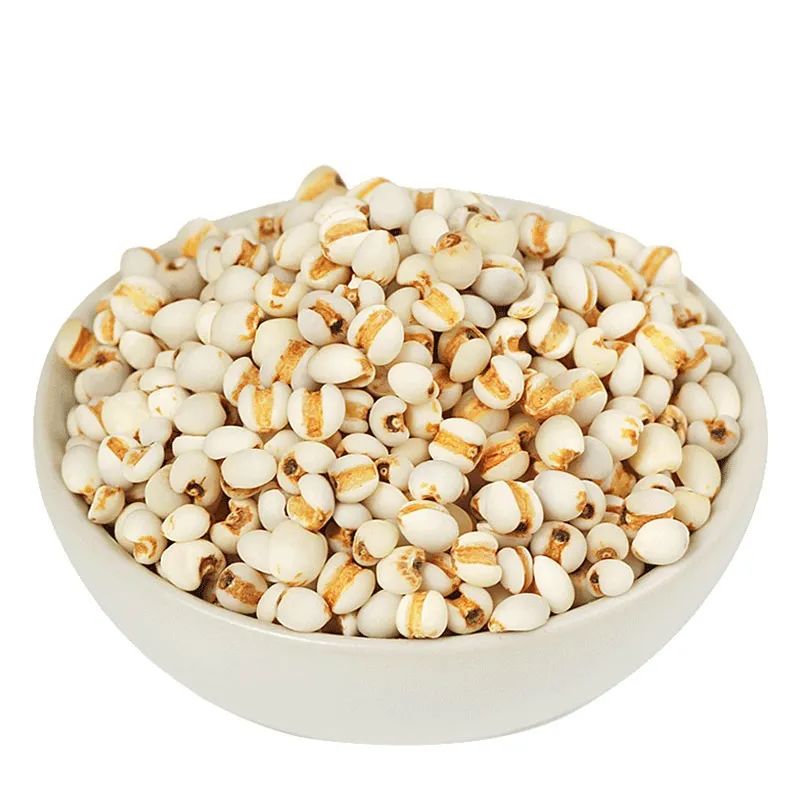
2. “Ben Cao Bian Du” Treats turbid dysuria. Can be used raw or stir-fried, depending on the disease and formula. Thus, the classics say to treat atrophy, one must take Yangming alone, and the physician should use it to relax the muscles. Yao Yi Ren is sweet, bland, and slightly cold, entering the Lung, Stomach, and Spleen. Its function can also strengthen the Spleen and benefit the Stomach, but it is not as tonifying as Shan Yao (Chinese Yam). It clears heat and drains dampness, which is Yao Yi Ren’s strength, thus it can treat lung abscess, lung atrophy, abdominal fullness, and yellowed dysentery. As for contraction, beriberi, and atrophy, all stem from lung heat and stomach dampness, causing the muscles to be affected. 3. “Ben Cao Chong Yuan” Yao Yi Ren, a type of grain, grows in summer and matures in autumn, sweet in taste and white in color, its nature is slightly cold, inheriting the essence of Yangming Metal and Earth. It primarily treats muscle contraction and stiffness, which cannot bend or stretch; Yangming governs moistening the muscles, which bind the bones and facilitate movement. If the muscles are moist, they will harmonize. If the mechanism is facilitated, bending and stretching will be easy. Moreover, Metal can control wind, and Earth can overcome dampness, thus treating chronic wind-damp bi syndrome. The Lung belongs to Metal and governs Qi, Yao Yi Ren inherits the Metal Qi of Yangming, thus it governs downward Qi. Treats chronic wind-damp bi syndrome, hence long-term use lightens the body and benefits Qi.
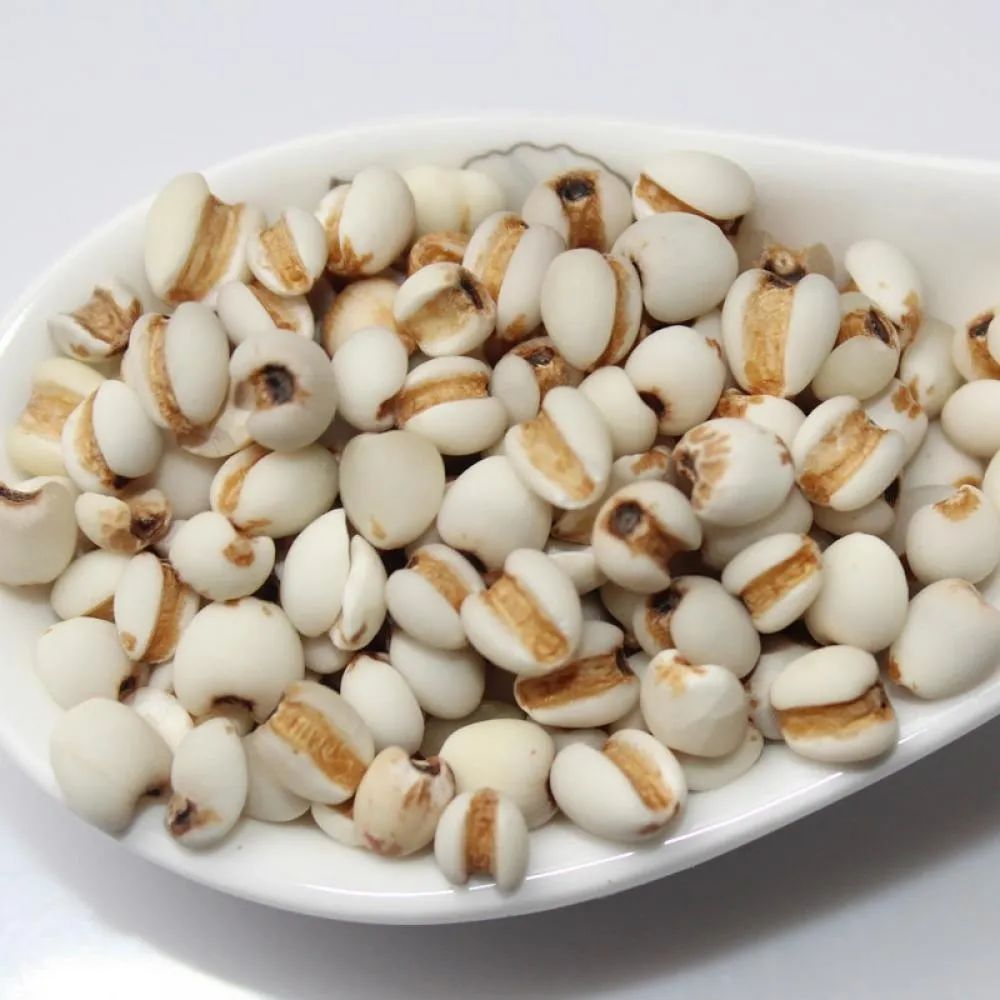
4. “Ben Cao Cong Xin” Treats edema, damp bi syndrome, beriberi, diarrhea, and heat dysuria. Benefits Earth to generate Metal, thus tonifies the Lung and clears heat (white enters the Lung, slightly cold and clears heat). Treats lung atrophy, lung abscess, cough with purulent blood, and so on. Supports Earth to suppress Wood, thus treats wind-heat muscle contraction (Jueyin wind wood governs muscles, yet treats muscle and bone diseases, using Yangming as the basis). Yao Yi Ren is effective for treating dampness and can be used for various conditions.

5. “Zeng Guang He Ji Ju Fang Yao Xing Zong Lun” Sweet, bland, slightly cold, and non-toxic. It primarily treats muscle contraction and stiffness, wind-damp bi syndrome, promotes Qi downward, eliminates evil Qi from the muscles and bones, promotes diuresis, and allows for better appetite. Long-term use lightens the body and benefits Qi. Its root can expel three types of parasites.
